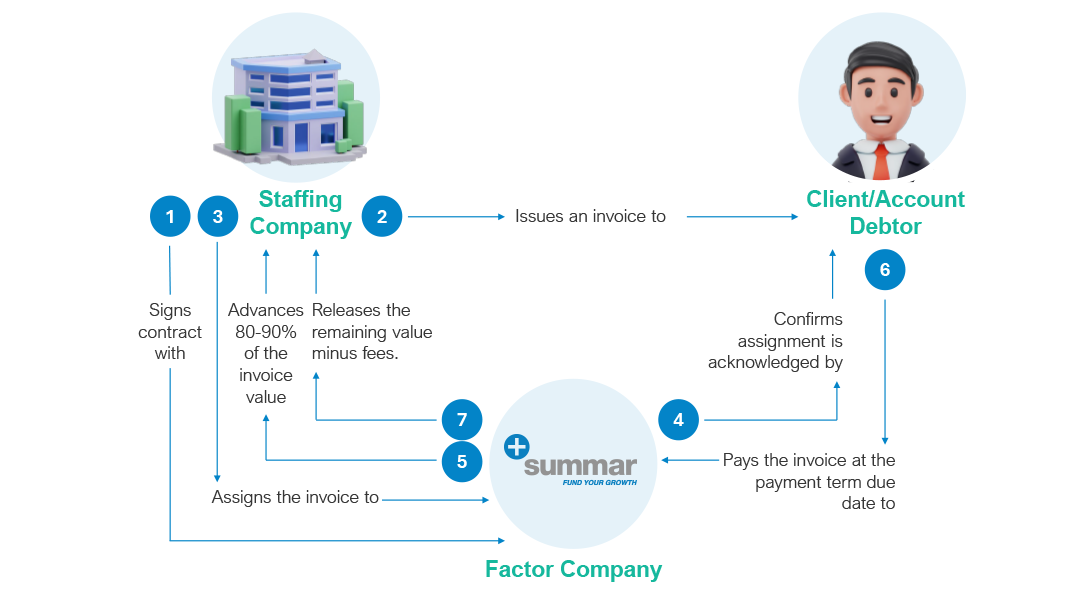
Staffing firms are the backbone of modern workforce management, providing crucial human capital solutions driven by a timely and compliant payroll. That's why the ability to make prompt payroll payments is not just a matter of operational efficiency but is central to talent acquisition, compliance, and growth.
A solid factoring solution eliminates the guesswork and uncertainty that extensive client payment terms might create as staffing agencies navigate the challenging demands of today's market and economy.
In a previous post, we covered the advantages of factoring for temp agencies. Now, we delve into the mechanics of how factoring works. We'll explore the step-by-step process of factoring in staffing companies, shedding light on how this practice can bolster financial stability and facilitate expansion.
First and foremost, it's essential to understand that invoice factoring is not borrowing. It's not a classic line of credit you draw down. It's not debt. Factoring, or payroll funding, is selling your invoices to a third party – a factor. It's a tool to help you improve your balance sheet, cash flow, and growth. And it's very easy to execute.
Let's take a top-line run-through of the factoring process:

- Factoring Contract: As with anything in business, staffing factoring requires a contract. It's fully transparent with clear terms and conditions. With a contract in place, business funding can start.
- Invoice Submission: The recruiting firm invoices their clients and sends a matched set of invoices to the factor after delivering their services.
- Cash Advance: With the approved invoice from the debtor, the factoring company advances 80-90% of the invoice value to the agency.
- Client Payment: Once the payment term is due, be it net 30, net 60, or net 90, the client pays the invoice amount to the Factor.
- Remaining Balance: Once the payment is received, the Factor releases the remaining value (10-20%) to the staffing company, minus factoring fees. This is called the 'reserve'.
- Administering the Transaction: Here's the critical part: the factor manages the back end of the transactional loop. They collect the money, pay the staffing firm, track the balances and aging, and tie it all off with the key reporting metrics.
So, here's what happened. The staffing firm generated something of great value: their invoice. The Factor purchased the invoice and advanced up to 90% of the value to the staffing firm, allowing them to cover payroll and operating costs. The client company then paid the factor directly, and the staffing firm received the balance due (its reserve), completing the factoring loop. Transaction closed, onto the next transaction. It's that easy.
Factoring is clearly a valuable financial tool for staffing agencies, whether temporal or permanent, serving various industries with different payment terms. Staffing companies are very exposed to aging. By leveraging factoring, staffing agencies can enhance cash flow, manage operational costs effectively, and seize growth opportunities without being hindered by cash flow constraints.
Summar Financial, the Factoring Solution for your staffing firm
With over two decades in the industry, we've honed our expertise to offer more than just funding; we provide consultative financial solutions for staffing companies seeking to optimize their operations. Summar enables staffing agencies to enhance cash flow, manage operational costs efficiently, and seize growth opportunities by facilitating prompt payroll payments and eliminating the uncertainties of extensive client payment terms. It's time to break free from financial constraints and elevate your business with Summar Financial.
Don't wait. Unlock your full potential - contact us today and connect with an expert who understands your staffing business.
